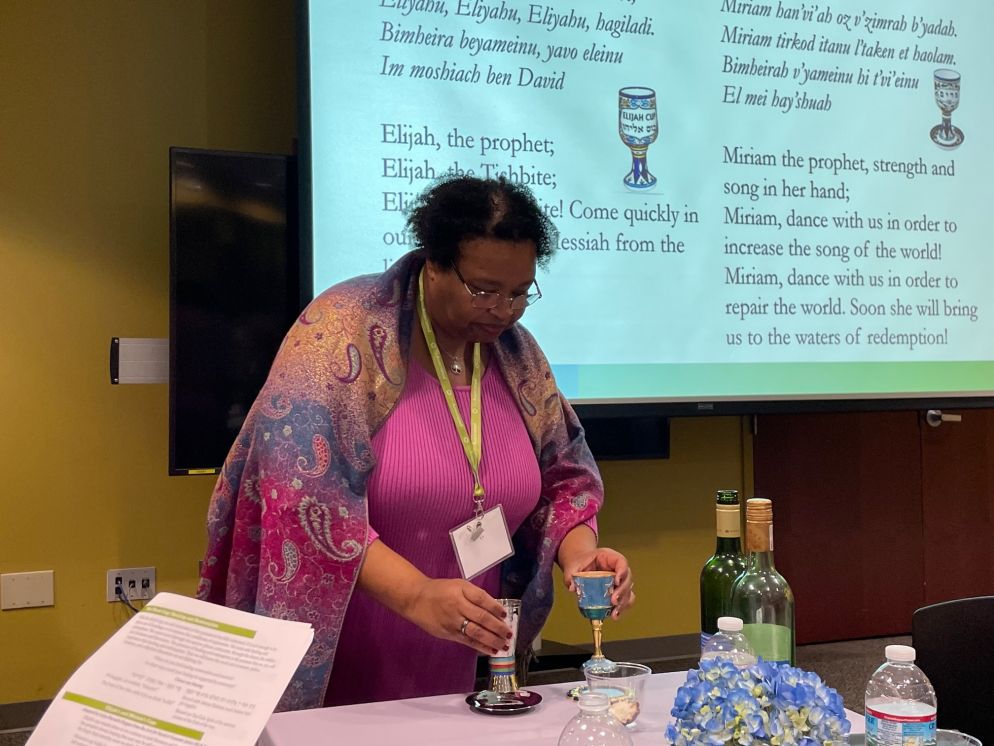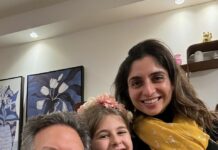The Associated: Jewish Federation of Baltimore held its first-ever Jews of color Passover seder at the Weinberg Park Heights JCC on March 27. The seder is the latest in a series of events designed to be more inclusive of Jewish people of color, as well as of Indigenous, Sephardic and Mizrahi Jews in the Baltimore area, reflecting their cultures and how they shape their Jewish experience.

The seder was the brainchild of Harriette Wimms, who was hired as The Associated’s inaugural Jews of color engagement fellow in 2022. Wimms has also been involved in organizing other JOC-focused events for The Associated, such as a recent JOC dinner held at the Johns Hopkins Hillel.
The Associated’s seder had been in development for a few months.
“We’ve been thinking about engagement in a number of ways,” Wimms explained. “One is exploring the ways that The Associated and its agencies are welcoming spaces for Jewish people of color and ensuring we can provide convening spaces for Jews of color and our loved ones.”
Wimms noted that the Passover story, of liberation from slavery, can be especially poignant for Jews of color. The slavery narrative can strike a chord for Black Jews, especially those who identify as American descendants of slavery. Today, people of color are still far more likely than white people to enter into the penal system. According to the NAACP, African Americans are incarcerated at more than five times the rate of white people, and many of them are made to engage in prison labor.
Planning the seder proved especially meaningful for Wimms, who had recently embarked on a Reconstructing Judaism pilgrimage focused on examining racial justice and the Civil Rights Movement through a Reconstructionist lens. She traveled to important historical sites in Alabama and Georgia with a cohort of other Jews of color.
“I had a number of experiences where I learned even more about the enslaved people from Africa who were kidnapped and brought to North and South America,” she recalled. “And it was a life-changing event for me. I realized that the fact that I’m here is an absolute miracle. My ancestors had to endure so much for me to be here, and that is an experience in consideration for Jews collectively, and most certainly Jewish people of color.”
“I’m an American descendant of slavery, so being able to celebrate freedom is very heartfelt to me,” said KeSean Johnson, a seder attendee who serves as part of Bolton Street Synagogue’s social action committee. “I think it’s important for Jews of color to always understand that their place is everywhere that the divine has provided for people to breathe.”
The seder used the Mixed Multitudes Haggadah, which was written by members of Jews for Racial and Economic Justice in 2016. It ties the themes of the Passover story to the experiences of oppressed peoples.
The Haggadah also introduces a few new additions to the seder plate: collard greens to represent the bitterness of racial injustice, chocolate to represent the bitterness of modern slavery and an orange to represent gender and sexual equality and justice.
In planning the seder, Wimms made sure to consider the 10 identity pillars identified by the Jewish Equity, Diversity and Inclusion leadership program organized by the Jewish Federations of North America. These are traits of underrepresented groups that should be considered when creating inclusive programming, and they include race and ethnicity, LGBTQ status, Jewish religious affiliation, gender and more.
One thing she made sure to focus on was accessibility.
“As a person with disabilities, it was very important to make this an accessible event,” she said. Wimms created a visual presentation version of the Haggadah so people with hearing difficulties would be able to follow along.
“There’s a sense of belonging at these kinds of [JOC-centered] events that is a big draw for me,” said attendee LaSandra Hart. “I don’t always get to be heard and seen in other synagogues. I’d been looking forward to this seder, and to celebrate with others in my community, for weeks.”
After the seder, Wimms is working on creating more JOC-centered programs as part of The Associated, focusing on racial justice, community bonding and hearing feedback from Jews of color in the Baltimore area.
“Passover, to me, is the promise of the impossible,” added Arlene J.M. Grant, another seder attendee. “It’s the promise of believing that even in the midst of whatever difficulty you are facing, that there is designed justice. It’s a call to trust and believe in what others say is impossible.”







